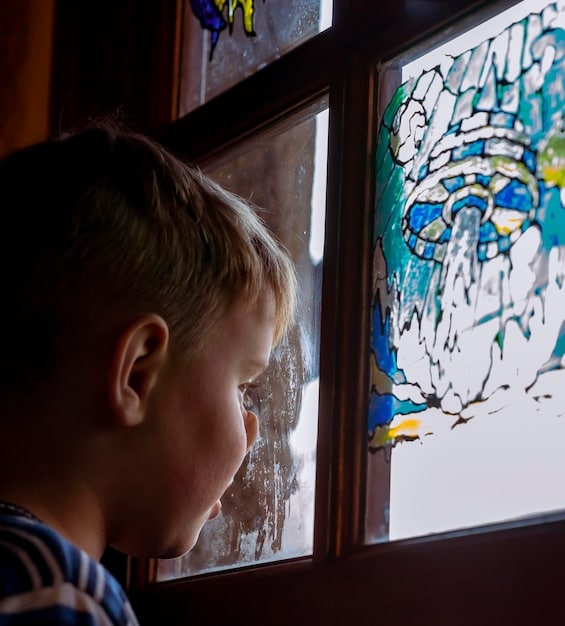How to Talk to Your Kids About Tragic News: A Step-by-Step Guide

Talking to your children about tragic news events requires honesty, age-appropriate language, and a focus on their emotional well-being, providing them with accurate information while reassuring them and offering comfort.
Navigating conversations with children about distressing news can be challenging. This guide offers a structured approach on how to talk to your kids about tragic news events: a step-by-step guide, ensuring they feel safe, informed, and supported during difficult times.
Understanding the Impact of Tragic News on Children
Tragic news events can significantly impact children, affecting their emotional and psychological well-being. Understanding how they process and react to such information is crucial for providing appropriate support.
Emotional Responses
Children may exhibit various emotional responses to tragic news, including fear, anxiety, confusion, sadness, and anger. These reactions can manifest differently depending on their age, personality, and previous experiences.
Cognitive Processing
Younger children may struggle to understand the concept of death or the permanence of tragic events. Older children might grasp the severity but struggle with feelings of helplessness or vulnerability.

Here are some key considerations:
- Age Appropriateness: Tailor your explanation to their developmental level.
- Emotional Availability: Be prepared to offer comfort and reassurance.
- Honest Information: Provide facts without overwhelming details.
Acknowledging and validating their feelings is the first step in helping children cope with tragic news. By understanding their perspective, you can offer the support they need to navigate these difficult emotions.
Creating a Safe and Supportive Environment
Before initiating a conversation about tragic news, it’s essential to create a safe and supportive environment where children feel comfortable expressing their thoughts and emotions.
Timing and Setting
Choose a quiet, comfortable time and place where you can talk without distractions. Ensure you have ample time to address their questions and concerns. Avoid discussing tragic news right before bedtime, as it may disrupt their sleep.
Active Listening
Pay close attention to what your child is saying, both verbally and nonverbally. Make eye contact, nod, and use verbal cues to show that you are actively listening. Avoid interrupting or dismissing their feelings.
Consider this advice:
- Be Present: Give your child your undivided attention.
- Show Empathy: Acknowledge their feelings and validate their concerns.
- Offer Reassurance: Remind them that you are there to support them.
A safe and supportive environment allows children to process tragic news in a healthy way. It provides them with the security to express their feelings and ask questions without fear of judgment.
Delivering Information in an Age-Appropriate Manner
When discussing tragic news with children, it’s crucial to deliver information in a way that is appropriate for their age and developmental level. Avoid overwhelming them with graphic details or complex concepts they may not understand.
Preschoolers (Ages 3-5)
Young children may not fully grasp the concept of death or the permanence of tragic events. Keep explanations simple and focus on their immediate safety and well-being. For instance, you might say, “There was an accident, but you are safe, and I am here to take care of you.”
Elementary School Children (Ages 6-11)
Children in this age group can understand more complex explanations but may still struggle with abstract concepts. Provide factual information in a straightforward manner, avoiding sensationalism. Encourage them to ask questions and address their concerns honestly.

Teenagers (Ages 12+)
Teenagers can understand complex issues and may have strong opinions about tragic events. Encourage open dialogue and provide opportunities for them to share their perspectives. Be prepared to discuss difficult topics such as violence, injustice, and grief.
Key Strategies Include:
- Simple Language: Use words they can easily understand.
- Limited Details: Avoid overwhelming them with excessive information.
- Honest Answers: Be truthful but age-appropriate in your responses.
By tailoring your approach to their developmental level, you can help children understand tragic news without causing unnecessary anxiety or fear. It’s about finding the balance between honesty and sensitivity.
Answering Difficult Questions Honestly
Children often have numerous questions after hearing about tragic news. Answering these questions honestly is crucial for helping them process their emotions and understand the situation, but it’s important to remain age-appropriate and sensitive.
Addressing the “Why” Question
One of the most challenging questions is “Why did this happen?” It’s often impossible to provide a satisfactory answer, as tragic events can be senseless and incomprehensible. Instead of offering simplistic explanations, acknowledge the complexity of the situation and validate their feelings.
Dealing with Fear and Anxiety
Children may worry about their own safety or the safety of their loved ones. Reassure them that tragic events are rare and that adults are working hard to keep them safe. Focus on practical measures that are being taken to prevent similar incidents from happening again.
Remember the following guidelines:
- Be Prepared: Anticipate common questions and prepare thoughtful responses.
- Stay Calm: Maintain a calm and reassuring demeanor.
- Acknowledge Uncertainty: It’s okay to say, “I don’t know,” when you don’t have an answer.
Honest answers, delivered with empathy and sensitivity, can help children feel more secure and supported during challenging times. It’s about creating a safe space for them to express their concerns and seek clarification.
Managing Your Own Emotions
Before talking to your children about tragic news, it’s essential to manage your own emotions. Children are highly attuned to their parents’ feelings, and your anxiety or distress can exacerbate their own fears and concerns.
Self-Care Strategies
Take time to process your own emotions before discussing the news with your children. Engage in self-care activities such as exercise, meditation, or spending time with loved ones. This will help you approach the conversation with a calm and supportive demeanor.
Seeking Support
If you are struggling to cope with the tragic news, don’t hesitate to seek support from friends, family, or a mental health professional. Talking to someone can help you process your emotions and develop strategies for supporting your children.
Important steps to consider:
- Process Your Feelings: Allow yourself time to grieve or process your emotions.
- Stay Informed: Understand the facts of the situation so you can provide accurate information.
- Model Healthy Coping: Show your children how to manage difficult emotions.
By managing your own emotions, you can create a more supportive and reassuring environment for your children. Your ability to remain calm and empathetic will help them navigate their own feelings and fears.
Focusing on Hope and Resilience
While it’s important to acknowledge the tragedy of the news event, it’s equally important to focus on hope and resilience. Help children understand that even in the face of adversity, there are opportunities for healing, growth, and positive change.
Highlighting Acts of Kindness
Share stories of people helping one another, acts of courage, and community support. These stories can inspire hope and remind children of the goodness that exists in the world. Focus on the resilience and strength of individuals and communities affected by the tragedy.
Encouraging Positive Action
Empower children to take positive action, such as writing letters of support, donating to relief efforts, or volunteering in their community. Engaging in meaningful activities can help them feel a sense of control and purpose in the face of tragedy.
Consider these actions:
- Share Positive Stories: Highlight acts of kindness and resilience.
- Promote Community Engagement: Encourage children to participate in positive activities.
- Focus on the Future: Emphasize opportunities for healing and growth.
By focusing on hope and resilience, you can help children develop a more positive outlook and a stronger sense of agency. It’s about fostering their ability to cope with adversity and find meaning in difficult experiences.
| Key Point | Brief Description |
|---|---|
| 💖 Create a Safe Space | Ensure kids feel comfortable sharing feelings. |
| 🗣️ Age-Appropriate Info | Adjust explanations to their understanding. |
| ❓ Answer Questions Honestly | Address their concerns with empathy. |
| 🌱 Focus on Resilience | Highlight hope and positive change. |
FAQ
▼
Begin by asking what they’ve already heard. This helps you understand their current knowledge and address any misinformation. Use gentle, simple language to introduce the topic without overwhelming them.
▼
Acknowledge their feelings and offer comfort. Let them know it’s okay to feel sad, scared, or angry. Provide physical comfort like a hug or holding their hand, and reassure them that you’re there for them.
▼
Completely shielding them isn’t always possible or beneficial. Instead, control their exposure and discuss the news together. This allows you to provide context and support their understanding in a safe environment.
▼
Explain the measures in place to keep them safe, such as school safety protocols or community efforts. Focus on the adults who are working to protect them, and emphasize that these events are rare occurrences.
▼
If your child exhibits persistent anxiety, sleep disturbances, or significant changes in behavior, consider seeking professional help. A therapist can provide additional support and coping strategies to help them process their feelings.
Conclusion
Talking to children about tragic news events is never easy, but with preparation, honesty, and empathy, you can help them navigate these challenging times. By creating a safe environment, providing age-appropriate information, and focusing on hope and resilience, you can support their emotional well-being and promote their ability to cope with adversity.





